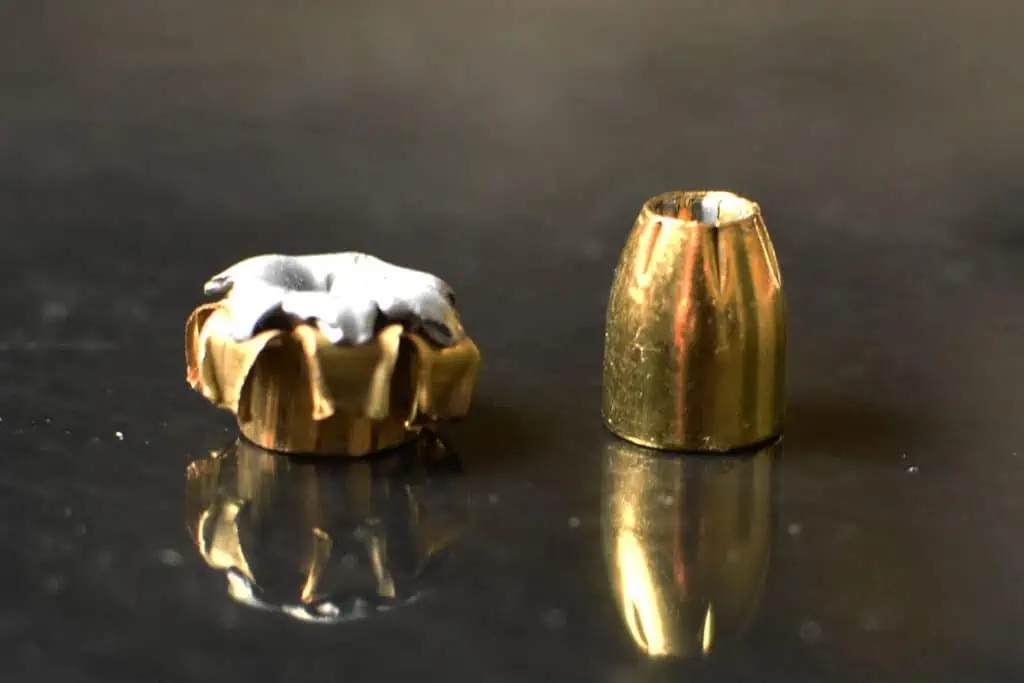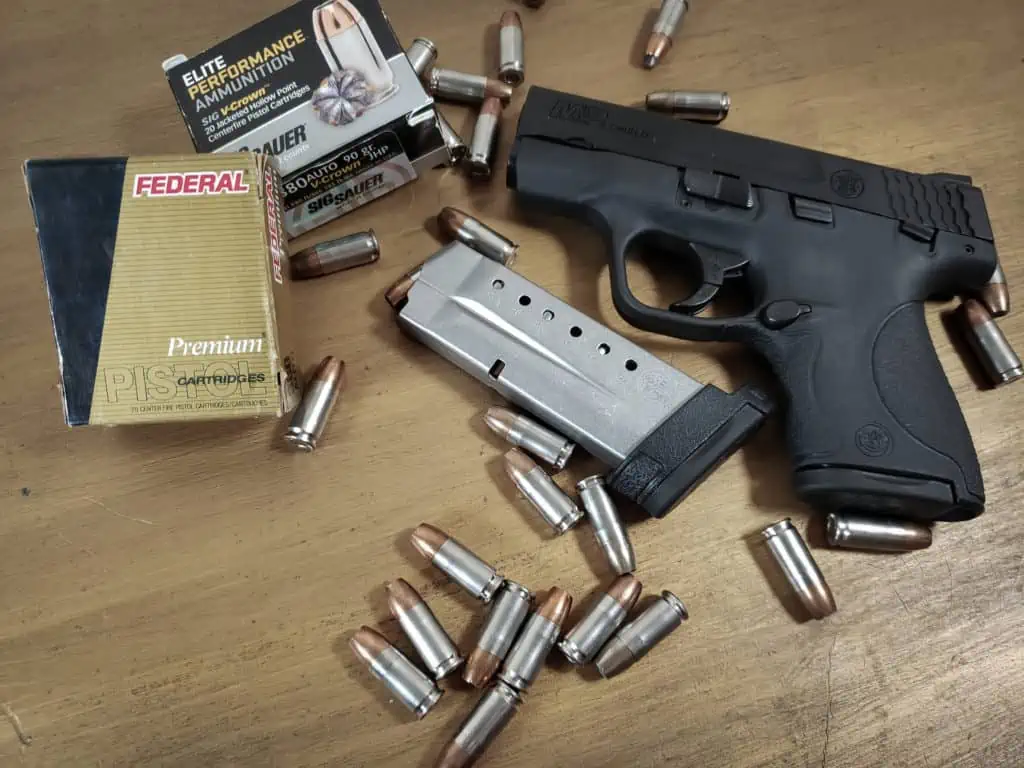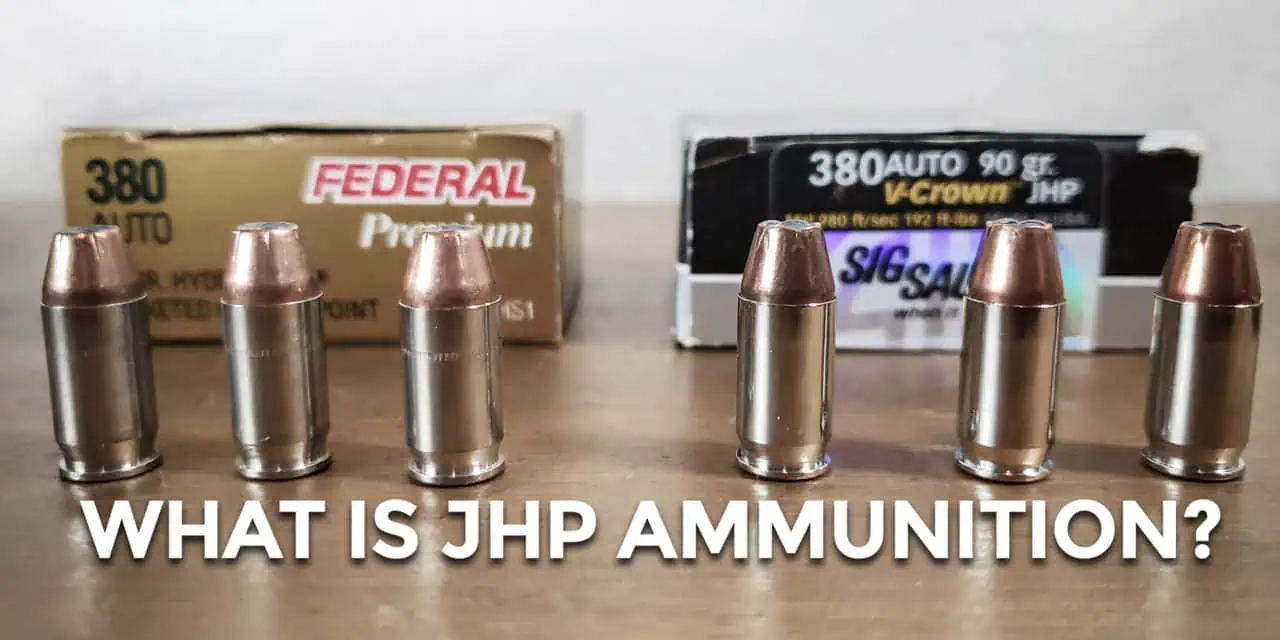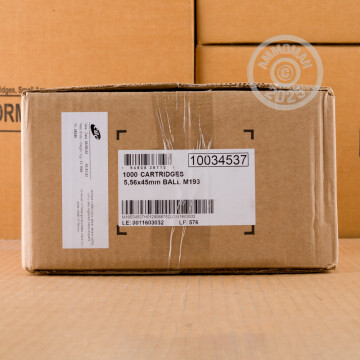Jacketed Hollow Point Ammunition:
What is it and Why Would You Want to Use it?
Few types of ammunition are more misunderstood than jacketed hollow point ammo. It is the bullet of choice for law enforcement and an all-around fantastic choice for self defense purposes. Yet it has a history of being attacked by uninformed politicians and grossly mischaracterized by the media.
To improve your understanding and dispel some myths about jacketed hollow point rounds, here’s an objective primer that includes everything you need to make an informed decision about jacketed hollow point ammunition, including when you should use it and when you should select something else.
What is Jacketed Hollow Point Ammunition?

An expanded JHP bullet (left) next to a bullet that has not been fired.
Jacketed hollow point (JHP) ammunition is designed to uniformly expand (AKA “mushroom”) on impact. It’s easy to spot because the top end of the bullet is, you guessed it, hollow. This clever expanding design allows the bullet to do three things really well:
(1) It reduces the risk of the bullet passing through the main target and harming someone or something else on the other side;
(2) It creates a larger wound channel; and
(3) It delivers more energy to the target than a non-hollow point bullet because of its expanded mass.
Unlike full metal jacket ammunition, which is made using the same basic process regardless of manufacturer, jacketed hollow point ammo is made with a few manufacturer-specific variations. The goal of uniform expansion is the same, but manufacturers get there in different ways.
Some hollow point bullets are made by bonding the lead core to the jacket in an effort to discourage fragmentation. Others use partitions in the middle of the bullet to control both the amount of expansion and the way it expands. Still others use a uniquely crafted tip that expands into sharp petals. Regardless of how it’s made, the JHP’s strength lies in its expandability, which improves your chances of quickly stopping an attacker.
Common Myths About Jacketed Hollow Point Ammunition
 There are many rumors and myths surrounding jacketed hollow point ammo that keep hanging on despite being disproved many times. One of the most common is that JHP is designed to be more lethal. It is true that JHPs create a larger wound channel than full metal jacket ammo. Yet they mainly exist to disable a threat while minimizing the risk of hitting anything or anyone in the surrounding area.
There are many rumors and myths surrounding jacketed hollow point ammo that keep hanging on despite being disproved many times. One of the most common is that JHP is designed to be more lethal. It is true that JHPs create a larger wound channel than full metal jacket ammo. Yet they mainly exist to disable a threat while minimizing the risk of hitting anything or anyone in the surrounding area.
Another myth about JHPs is that they can magically take down an attacker with a single shot using a handgun. JHPs are known for being very efficient at stopping a threat. That said, there’s no guarantee that a single shot will be 100% effective, regardless of the type of ammo you use.
When Should You Use JHP Ammo?
Jacketed hollow points are the standard in defensive ammo. If you’re searching for ammo to use with your concealed carry gun, JHPs are the right choice.
No matter what kind of ammo you use when practicing your self defense shooting skills, it’s a good idea to occasionally break out the hollow point ammo at the range. This will allow you to get a good feel for how the ammo performs and verify that it cycles properly through your gun.
JHP is also the type of ammo you should select for hunting unless your target is varmints or very small game. The larger wound channel increases your chance of taking your game down in a single shot, which is more humane. And, you may not have a choice. Several states require hunters to use bullets that expand or fragment on impact.
Hollow point ammo is also a popular choice with competitive rifle shooters. This is due to its solid reputation for providing an edge in accuracy. Rifle ammo marked as “match-grade” is almost always going to include a JHP bullet. (Take the Federal .308 Match King Gold Medal, for example.) If you plan to compete in a rifle sport that is focused on precision or long-range shooting, select a cartridge that’s made with a JHP bullet.
When Should you Use Another Type of Ammo?
Hollow point ammunition is interchangeable with other types of ammo from a functional perspective. However, the higher cost per round can make it expensive to shoot all the time. If you’re on a budget or planning to use a large volume of ammo for practice or training, you may be better served shooting full metal jacket ammunition.
There are also some states that regulate the sale or possession of hollow points in certain circumstances. Make sure to check your state’s laws to ensure JHP ammo is legal in your state for your intended purpose.
Determining whether you need to purchase jacketed hollow point ammunition is simple. If you are going to use the ammo in your carry gun, to go hunting, or to shoot in a precision rifle competition, then JHPs are your friend . If you’re going out to the range to shoot static targets or headed to a practical pistol match, then full metal jacket ammunition is a better choice.


